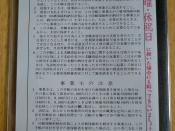Five Social Insurances and One Housing Fund
Table of Content
Chapter 2: Successful of Shanghai in "Five social insurances one housing fund" 4
Chapter 3: Impacts on Employer 5
Chapter 4: Impacts on Employee 6
Chapter 5: Precautions of Human Resources Management 7
Chapter 1: Introduction
"Five social insurances and one housing fund" was established under Labor Act Chapter 9 Article 73. It is used to serve the purpose on maintaining social harmony by protecting employee's benefits.
"Five social insurances" included endowment insurance, medical insurance, unemployment insurance, employment injury insurance and maternity insurance . "One f und" is referred to h ousing p rovident f und. Endowment, u nemployment , and medical insurance is to be paid by employee and the employer together whereas maternity and employment injury insurance only paid by employer.
However, the five insurance is statutory under Labor Law while h ousing provident fund doesn't. Each province has its own rate dependents on the economic development needs and other social factors. In recent years, Shanghai has the highest insurance payment rate among China.
Calculation on monthly insurance and housing provident fund payment in Shanghai
Monthly payment of insurance and housing provident fund
= Individual income before tax per month* Ã payment percentage
*Equal to average salary per month in last financial year x 60% - 300%
Average salary per month in 2012 is (RMB) 4692, therefore
Minimum and maximum range (RMB) = 4629*0.6 - 4692*300
= 2815 - 14067
Therefore, individual is required to pay for insurance in accordance to the following table:
Shanghai Standard Payment of Social Insurance and Provident Fund 2013/14
Categories | Employer | Employee |
E ndowment Insurance | 22% | 8% |
Medical Insurance | 12% | 2% |
Unemployment Insurance | 1.7% | 1% |
Maternity Insurance | 0.8% | |
Employment Injury Insurance | 0.5% | |
Housing Provident Fund | 7% | 7% |
*Noted that for those who are taking unemployment insurance, they do not need to pay for Medical Insurance
Chapter 2: Successful of Shanghai in "Five social insurances one housing fund"
Figure 1
According to figure 1, it showed that the pay ratio of Shanghai enterprise was higher than Beijing and Guangzhou while the ratio for individuals were the same. The reason of the high ratio fee is to protect the worker's income, so that the workers would not need to pay half of their income for insurance payment. Therefore, the living standards for the workers would keep in average.
In this few years, the development of other cities in China was being fast and the insurance package was attractive to workers. So there was a competitive existed between Shanghai and the developing cities. The Shanghai enterprise wanted to retain their workers to stay in Shanghai for work and keep the quality and quantity of the business. Therefore, the standard for the percentage pay of enterprise would be higher than others. Once a worker reach the retire age, the worker will be entitled to receive the insurance premium. This policy would be one of the methods to attract and retain the local worker to work.
On the other hand, as the housing provident fund was not a legal payment in the Labor Act. So the percentage for both enterprise and individuals in Shanghai was the same, 7% each. In the view of HR, the cost for the enterprise would be lower and the intense pressure would be less. And for the individual, they would save the money to buy a property.
Lastly, Shanghai has done a good job in the "5 insurance and housing fund" than other cities like Guangzhou. Although the enterprise need pay more than other cities, the workers would take the greatest benefits and be more loyal to the company.
Chapter 3: Impacts on Employer
The social insurance system has implemented for several years, it is time to review its impacts on local enterprises in Shanghai, China.
The most seriously the system imposed a heavy burden on operating cost of business. According to the Social Insurance Policy, enterprises should make a contribution to each of these types of social security on behalf of their employees. Employees are also required to make contribution to some of them. "A Taiwaness enterprise in Shanghai reported the Law has increased its labour cost on insurance participation by 50 percent",
Mr. MBA, "å°åå §æå¤æ£ çéãé¸ãéå¤", 26 June 2012
which is mainly due to the extension of insurance coverage that leads to the rise in premium payment and related expenses. " In 2010, urban pension, medical, unemployment, occupational injury and maternity insurance altogether recorded a person-time of 1.108 billion, 84 million more than that of 2009. The total income and expenditure of the National Social Insurance Fund reached RMB1.86 trillion and RMB1.48 trillion, increased by15.7% and 20.4% respectively when compared with those of 2009."
Professor Wang Yanzhong, Director, Labour and Socail Security Research Centre Chinese Academy of Social Science, "Prospects and Impacts of Social Insurance Law Implementation", Road to China, Spring 2011
A significant part of the increased expenses came from the upsurge of enterprises' expenses which lowered competitiveness of enterprises as most of the capital resource would constitute the main part of the payment system. Also, there were rise in the labour cost of enterprises, especially in those labour-intensive ones, and thus employers may force to lay off workers or cut wages in order to keep the company alive.
However, in the long term, the expansion in social insurance coverage would establish a more standardized and stable employment environment, which is important in maintaining employers' trust in their enterprises and reinforcing their sense of responsibility and cohesion.
Chapter 4: Impacts on Employee
For the impact of employee, In order to safeguard the legitimate rights and interests of employees and building a harmonious society , the government not only vigorously promotes the social security work and expanding the coverage of the " five insurance" in China. This policy is large extend to gain the recognition and support by the all sectors of the community . Some socially responsible company also believes that the implementation of this policy will be benefit to employees for future and so many companies actively to purchase of " five insurance " for their employees .
The implementation of social insurance for employees with long-term benefits , such as when an employee reaches retirement age , he or she can receive monthly pension until his death ; under the social security . If women employees pay maternity insurance can obtain limits reimbursement of expenses including prenatal examination and surgical expenses . Beside, under the employment, employees can earn 2 to 3 monthly compensation through unemployment insurance, it can effectively to solve and protection of employees living expenses during periods of unemployment . Employee also can extract the housing provident funds for housing - related expenditure purposes .
However, due to some local government in the development the standard payment of "five insurance" that requires enterprise according to the average wage to pay, rather than the actual amount of wage subject to each industry. Since the majority of employees' wages is less than the average wage , if the government accordance with average wage as a payment standard, the result is employer would deduct a large sum of money in the employees their wage, eventually employees wage they earn is less.
In addition, due to the policy and standard of purchases social insurance is diversity by different province in china, when foreign employees return to home town from local, Employees need require the Ministry of Labor to end of the social security relationship before they can get back the balance on the personal account. Thus, it would lead to employees on future retirement not be protected ; On the other hand , the company pay for employees social security fees cannot bring the benefit to employees ,the result that would reduce the enthusiasm of enterprises to participate in social insurance .
Chapter 5: Precautions of Human Resources Management
An ol d-age insurance can be interrupt ed. If the employees pay more, he will get more pensions. However, the q uality of life cannot be guaranteed after retirement . Many employees think that social security has been considered and it is so comprehensive . Therefore they are no need to have other financial
In fact, the pension formula is quite complex, but generally can be calculated as follows: 20% of the average wages of individual accounts a total of 120. Obviously, the social security pensions cannot guarantee the quality of life after retirement . Therefore, the HR of the company can choose to commercial insurance for pension supplement and provide it to the employees.
For example, it can include the health protection and accident protection. Also, if the pension plan of the commercial insurance is expired, the employees will get some money as a pension supplement. Those insurance are suitable for young people such as some recently married, capital investment is not enough. Therefore, it will help to attract and retain the people to join the company.
Moreover, the Health insurance is more important because i f it is interrupted for more than three months, it will lose effectiveness . There are many requirement of using the health insurance such as many restrictions about use in other p rovince . It is difficult to move and use in other province.
Finally, not all medical practices have access to insurance, such as: plastic surgery, increased myopia correction and other medical expenses. Therefore the HR can design to buy some inpatient medical allowance to the employees . Those politics can help to provide the security, attract, retain and motivate to the employees.
Reference
æé: "æ¢è¨å §å°ç¤¾æä¿éæ¹é©çç¼å± ââ èè«æ³°åºå士å°è«", World Labour,
16 April 2010
"æèªè¬å å°æå 7k åä¸å»£äºéªä¸éå人繳費æè¡", Takungpao, 28 August 2012
"[ä¿éª] 社ä¿äºéªä¸é æå£å®ä¸å°ä¼", Economic Daily News, 27 June 2012
åä¸å¹¿äºé©ä¸é个人缴费æè¡ ä¸æµ·"ä¸ä¸ä¸ä¸" http://finance.eastday.com/economic/m1/20120720/u1a6720470.html
å¸æ»å¯ä¸»å¸ä¾¯ç»§åï¼åäºè®©æ¯åèå·¥é½äº«æä½æ¿å ¬ç§¯é, ä¸æµ·å¸ä½æ¿å ¬ç§¯éç½http://www.shgjj.com/html/zyxw/55406.html
ä½æ¿å ¬ç§¯é
https://zh.wikipedia.org/wiki/%E4%BD%8F%E6%88%BF%E5%85%AC%E7%A7%AF%E9%87%91
ä¸çæé¾æäºé©ä¸é ä»ä¸æµ·æ¼å家ç¦å©ç¼©æ°´, 人æ°ç½
http://finance.people.com.cn/money/GB/17155184.html
"Social Security in China", Business Internet China
www.business-internet-china.com/business-china/report/social-security-in-china.php
"China - Social development", Encyclopedia of the Nations
www.business-internet-china.com/business-china/report/china-social-development.php
"New Social Insurance Law impacts foreign enterprises and foreign expatriates in China", China Business
www.business-internet-china.com/business-china/new-social-insurance-law-impacts-foreigne-enterprises-and-foreign-expatriates-in-china.php


